#deaf west theatre
Text
deaf west theatre just announced that they’re doing american idiot and i am begging for someone to get ANY footage of it, this is so important to me
22 notes
·
View notes
Text
Spring Awakening but it’s narrated by Hanschen Rilow
#spring awakening#spring awakening musical#spring awakening memes#hanschen rilow#Ernschen#hernst#musicals#broadway#deaf west spring awakening#deaf west theatre#ernst robel#melchior gabor#moritz stiefel#wendla bergmann#ilse neumann#andy mientus#Jonathan B Wright#ben fankhauser#gideon glick#skyler astin#Martha Bessel#musical#broadway musicals#west end musicals#eugene o’neill#Playbill#Brooks Atkinson#Joshua Castille#musical theatre#theatre kid
67 notes
·
View notes
Text
Attention Guilty Ones
In case something happens to Twitter.
I want to make sure who ever needs it has access to the [CC] DWSA Videos List: [X]
Whether it’s your 1st time learning about the list or you want to re-watch fun memories.
No matter what happens with twitter, I am on here and Instagram.
Message me if you need anything.
#twitter#update#spring awakening#springbway#deaf west theatre#deaf awakening#dwsa [cc] videos#captions#austin mckenzie#sandra mae frank#katie boeck#daniel durant#alex boniello#krysta rodriguez#andy mientus#michael arden#treshelle edmond#kathryn gallagher#josh castille#daniel stewart#alex wyse#marlee matlin#ali stroker#miles barbee#sean grandillo#amelia hensley#broadway#guilty one#not gone
39 notes
·
View notes
Text
Consider: Deaf West style Matilda
Hear me out: Matilda in BSL or ASL would actually be the greatest thing. It's like the show was made for sign
Headcanon:
Matilda is is profoundly deaf but comes from a hearing family
Miss Honey is deaf too, and maybe one or two of her parents were as well
She sees a lot of herself reflected in Matilda
Crunchem Hall was originally meant to be a safe space for deaf or HoH kids/kids with deaf or HoH family, but now
Trunchbull is pushing and oralist agenda
When kids start to fingerspell or sign, she reprimands them and has them speak instead (like the Latin recitation scene in DWSA)
Chokey especially sucks because the kids can't communicate by sign since no one can see them
Lavender is HoH and as spoken communication isn't her strong suit, she likes to express herself through loud clothes and a big personality
Bruce is hearing, so when he's sent off to Chokey it makes a lot of kids scared since it could be a lot worse for them as they'd be even more alone
Matilda's pushback means a lot to the kids at school because it might be the first time they see someone like them making real change
The fear and higher stakes exacerbates the importance of the kids' rebellion and the bravery that goes into it
Revolting Children is the coolest thing ever because all the kids stand up and very deliberately incorrectly fingerspell every. single. word.
And the song - and the rest of the show - is not just them standing up for their classmate, it's them standing up for their own identities and the identities of people they love
(And obviously, we must sneak Marlee Matlin in there somewhere)
#matilda#matilda the musical#marlee matlin#deaf west theatre#broadway musicals#west end#theater#musicals#musical theater#dwsa
16 notes
·
View notes
Text
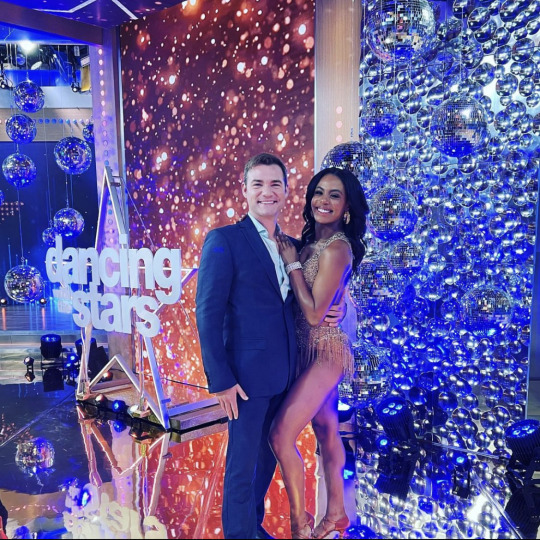
Daniel Durant is gonna be in Dancing With The Stars on Disney+ on September 19th!!! I’m so happy and excited for him, it’s gonna be so fun to watch!!
#daniel durant#daniel n durant#broadway#spring awakening#deaf west spring awakening#dwsa#dwsa cast#musical theatre#spring awakening broadway#broadway musicals#deaf talent#dancing with the stars#dwts#disney#disney plus#disney+#coda#coda movie#deaf west theatre
43 notes
·
View notes
Text
It being 2023 and only just discovering the amazing world of this one actress and the projects she has been a part of is such a bummer when the projects you’re interested in were something like a theatre show that is in another country, or an older one no longer in theatres but was once on YouTube a few years back, except it was taken down cause copyright (which I mean fair enough… but still, big bummer)
What I’m trying to say is- I WANNA SEE DEAF WEST SPRING AWAKENING. Something not filmed on a potato in minecraft quality😂😂😂💀😭
Anyways.. the internet is both a great tool and an annoying reminder of the things you cannot go see
7 notes
·
View notes
Text
Deaf or HoH Character of the Week: Matilda Wormwood
Matilda Wormwood (Matilda) is the daughter of Mr. and Mrs. Wormwood, and the sister of Michael Wormwood. Here are our thoughts:
Crunchem Hall is a school for the Deaf, and “School Song” features letter blocks with a fingerspelled font being pushed into the gates.
Matilda's affinity for storytelling is likely because she has no one to tell her stories to because of her language barrier.
Matilda's voice would play the violin, and the two are pretty much inseparable aside from their part in “Miracle.”
The beginning of "I'm Here" is acted out through a silhouette/projection, and the little girl is seen being beaten with a violin (Ellie’s dad seriously first watched this thinking Matilda was the little girl and was adopted, so she figured that doing such a thing would act as a red herring and create ambiguity, as Miss Honey’s voice is also a violinist.)
When Matilda is doing telekinesis, her voice is the one moving the objects.
10 notes
·
View notes
Text
I for one thoroughly appreciate that Troy Kotsur took one look at Daniel Durant and thought “Is anyone gonna be this kid’s father figure?” and did NOT wait for an answer
#I'm serious#go look at any of their interactions and tell me that's not father-son shenanigans#like that time with them in the hotel and the fog horn#no one's gonna see this#but I thought it was funny#I hope they do SO many more projects together in the future#troy kotsur#daniel durant#coda#coda (2021)#coda film#frank rossi#leo rossi#deaf west spring awakening#deaf west theatre#dwsa#spring awakening#moritz stiefel#dancing with the stars#dwts
16 notes
·
View notes
Text


I can't believe I missed this joke the first twenty times I watched this video.
[Image description: screenshot of Ingrid Michaelson's "Hell No" music video with four members of the Deaf West Theatre in mid-sign. The text reads,
"Mama said that the boys like you never work out anyway."
The next screenshot shows the three guys in the group, deadpan expressions on their faces.
"Boys like you" is repeated in parentheses.]
7 notes
·
View notes
Text
Part Two: Character Interactions with Shadows
Behind the cut because it’s long and detailed.
Throughout Acts One and Two, John resents having his signer constantly following him.
In public, he tries to stand in front of his signer to hide him, though obviously not when he’s signing anything. They’re physically closer, symbolizing that he not only carries the weight of his affair, but also the weight of keeping it hidden.
In private, though, he pushes his signer away from himself, and since his signer is more impulsive and tends to act on his own accord, signing too rapidly for him to catch up at times, he’s also trying to push his signer away from Elizabeth and Mary.
More on that last note: he pushes his signer away from both himself and Elizabeth (after the line “your justice would freeze beer,” he actually takes hold of his signer’s hands as if to ask why he needs to hurt them both). When Mary gets involved, he’s trying more to restrain his signer than get rid of him entirely (his signer is actually the one harming her because in my interpretation, he sees his faults in her–shirking her duties is failing Elizabeth, and they both fear telling the truth–but fails to realize she isn’t being purposeful about it).
After “Let you look sometimes for the goodness in me...”, his signer is frightened by his own intensity. He goes to Elizabeth, signs a pleading “sorry?” during the long pause, and reaches out his hands to hold hers. She accepts for a moment, then sadly lets go.
HIS SIGNER REMINDS HIM OF THE COMMANDMENT HE FORGOT BY CUING HIM WITH A “7” DURING THE SILENCE. This earns him a particularly hard shove. Elizabeth then proceeds to remind him out loud in unison with her voice, getting Hale’s attention and causing John to fear that his signer’s been exposed. He then tries to push his signer behind him to no success.
Starting near the end of Act Two when Elizabeth is arrested, John’s speech cuts out for certain lines and those lines are only signed.
For Acts Three and Four, John becomes more resigned to his signer’s constant presence, but still tries to control his signer’s increased intensity with a vague awareness of where it will end up.
His speech cuts out in a few key moments, most notably when his affair is revealed (he stares at his signer in shock for a brief moment but quickly resigns himself to this), but also when he tells Elizabeth he’s already confessed and when he delivers his “God is dead” speech.
Almost all of his lines in Act Four are signed only since he’s too broken and guilt-stricken to speak anymore, but once he asks Elizabeth whether or not he should confess, he begins trying to stop his signer--a halfhearted effort at first, but building into a more involved attempt at restraint the closer his signer gets to actually confessing. (His signer is now the one to shove him to the ground just before writing his name on the confession, but John himself is the one who refuses to hand it over and begins speaking his lines again.)
After John says he thinks there is still some goodness left in him, his signer offers his hands to him, and he accepts. (To make this even more poignant, what if his signer, impulsive as he is, is tired of shouting at him all the time and offers his hands throughout the play, only to be rejected? Their relationship is complicated because as much as he wants his soul to rest, he can’t quite find it in himself to give it permission to do so and just tries to shove his turbulent feelings as far down as possible until they boil over.) John does his own signing when he’s consoling Elizabeth.
Elizabeth’s voice, as bent-over and uncertain as she is for Acts Two and Three, is always trying to protect her.
Her voice calms her down throughout the turbulent events of Act Two and refuses to let themselves be separated by the authorities. There’s a new layer added to Elizabeth being chained during her arrest because she’s being prevented from communicating as well. In distress, she tries to pull herself free, and her voice, enraged on her behalf, tries to help her, but their efforts are all in vain and the most her voice can do is console her and stop her from trying again, concerned that she’ll hurt herself from pulling too hard.
For Act Three, they’re farther apart--her voice stands between her and John, and when the stage directions say “in a crisis of indecision she cannot speak,” the lights go off on everyone around them. The spotlight is now on her and her voice, who runs towards her and pleads with her not to lie by gently but firmly clasping her hands. Elizabeth just pushes her voice back towards John in a regretful, but determinedly protective manner, and speaks her lie aloud in defiance of her voice, who has gone silent. As the two are being dragged away, her voice stares at her in disappointment and betrayal, only to soften and join her in her anguish.
During Act Four, Elizabeth’s voice brings her towards John and prompts her to forgive. Like in Act Two, her voice is a source of comfort and even offers to dry her eyes for her at a few different points throughout the act. The stage directions say she grips the bars on the window tightly to keep herself from collapsing, but I say this version should have her voice hold her up instead in the same way so that she can actually sign her last lines (even though they’re both speaking them out loud as well). With nothing more to say, she wraps her arms around her voice, who strokes her forehead gently with a heavy sigh, eyes closing. Realizing that her voice is not at all fine, Elizabeth is actually the one reassuring her now and pats her shoulder firmly, almost as if to say their day will come soon and the world will wake up.
Hale and his signer start out close in Act One, but gradually drift apart from each other.
In Act Two, his signer is near the Proctors (who are appealing to him rather than to Hale because they know that his uncertainty lies in the fact that they seem like good people with no reason for suspicion otherwise) while Hale himself stands far from them. As the questioning goes on and he finds things against them, his signer moves closer to him but still looks confused.
In Act Three, they’re farther from each other and look even more lost. His speech cuts out when he’s imploring Danforth to give John and company a chance, and later when he denounces the proceedings. He begins to shut down as his signer leaves, but snaps to attention upon seeing that his signer also left the door open for him. In a desperate last burst of hope, he runs after his signer, only for him to find that his signer has already left the stage. As Danforth calls after him, “Mr. Hale! Mr. Hale!”, all he can do is mouth the line along with him, longing for his old self.
In Act Four, Hale’s speech seems to have all but permanently cut out. His signer is a little closer to him because his tunnel vision makes him a little more certain of what he needs to do now, but they’re still more distant than they were when they started, and his signer is still a little doubtful that he’s doing the right thing. Hale has become so much more forceful towards his signer, both because he can’t let this fail (there’s probably at least some part of him that has embarked on this with the hopes that he’ll feel good enough about himself to speak again--I once had a brief debate with my literature teacher on whether he truly wants to save the accused or whether he just wants to feel less guilt, then concluded it’s the former with aspects of the latter) and because his signer looks as if he’s constantly on the verge of tears. Hale abandons his signer and his own hope of ever being able to speak again after John tears the confession and decides it is better to hang. His signer, upon seeing Elizabeth’s reasons for not convincing John to change his mind and upon realizing that she has her certainty now but that he never will, loses his composure completely and runs off.
Mary’s voice tends to cling to whomever she believes following will save her. The two are often separated, as she is described as lonely in the stage directions and is at a deep sense of disconnect with herself.
After Abigail betrays her in Act Three, she signs one-handed and holds her voice with the other hand, but she’s using her dominant hand to sign, meaning she’s holding her voice with her weaker hand. When she recants her statement, her voice leaves (either because she lets go or because the other girls were able to pry her hand open).
Tituba, like Mary, tries to control her voice as she denies the accusations, but her voice pushes her to the floor and prompts her to confess when she decides to stop resisting.
Giles is a small man, but his voice is a large, imposing man who tries to protect the people he cares about.
When he threatens to kill Mr. Putnam, his voice seems already halfway to doing so! (The physical contrast between the two of them might add a bit of levity to this because his voice is far more capable of carrying out such a threat than he is, or it could be more symbolic, a warning that he’s far too tenacious to let Mr. Putnam get away with this.)
During Act One, Parris does not enter with his signer because he’s tending to domestic matters and doesn’t need to put up a front. (He seems to show hints that he’s genuinely distraught over Betty’s state at first, even though he’s messed-up enough to later prioritize his own reputation.) His signer first enters with Abigail and Susanna Walcott.
You’re probably wondering why I didn’t mention Abigail and her voice here, but that’s because they’re primarily a pair trying to influence other characters, so I’ll cover them in the section about character interactions with other shadows.
13 notes
·
View notes
Text
Watch "Biblical (American Sign Language Version – In Collaboration With Deaf West Theatre)" on YouTube
youtube
#Youtube#biblical#sign language#ASL#asl trio#american sign language#collaboration#artist collab#collab music#Deaf West Theatre#worship music#worship#music#christian music
1 note
·
View note
Photo

Nothing’s more civilized than enjoying a classic Greek tragedy outdoors at the Getty Villa, especially when the temperature is 20 degrees cooler than at your house. Deaf West Theatre and the Getty presented “Oedipus.” Still packing a punch all these 2,500 years later.
1 note
·
View note
Text
What are some of your controversial opinions about The Tony Awards or Olivier Awards? (Shows/People that should have won)
#musicals#broadway#west end musicals#theatre kid#the tonys#tony awards#musical theatre#broadway musicals#deaf west spring awakening#falsettos#revival#musical review#west end theatre#theater#olivier awards#newsies#hamilton musical#sweeney todd broadway#chicago musical#wicked#six musical#moulin rouge#west side story musical#the phantom of the opera#sweeney todd revival#into the woods#parade musical#jason robert brown#sondheim#andrew lloyd webber
29 notes
·
View notes
Text

Hey op stop talking
#Don't tell me this#Newsies#spring awakening#deaf west spring awakening#musicals#music#musical theater#musical#theatre#musical theatre#broadway musicals#broadway#how dare you
224 notes
·
View notes
Text
Since i’m obsessed with DWSA and Sing Street I’ve been trying to come up with a possible Deaf West style staging for Sing Street for fun (as one does) and at first I couldn’t see it being possible but now I feel like it wouldn’t be that bad, it’d just have a huge cast lmfao.
#i do this with a lot of shows#bear with me#every show needs a deaf west version#deaf west sing street?#broadway#musical theatre#deaf west theatre#spring awakening#deaf west spring awakening#dwsa#spring awakening broadway#broadway musicals#sing street#sing street musical
8 notes
·
View notes
Text
some of my favorite musical theatre production photos (part 1)

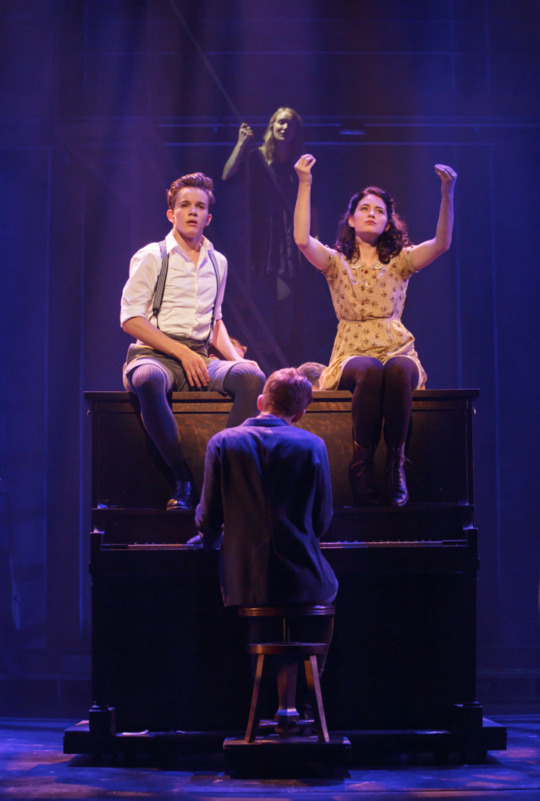

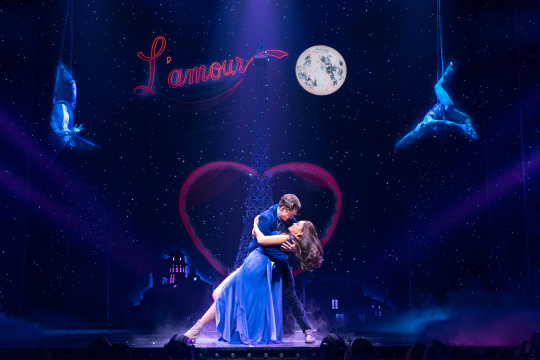
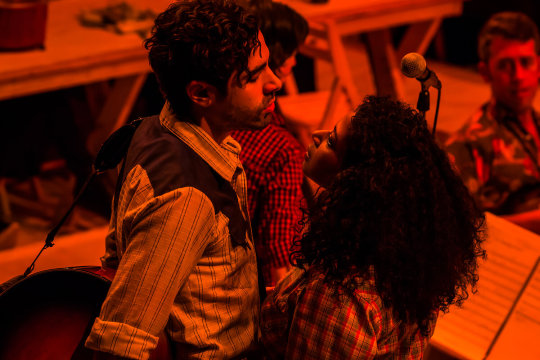
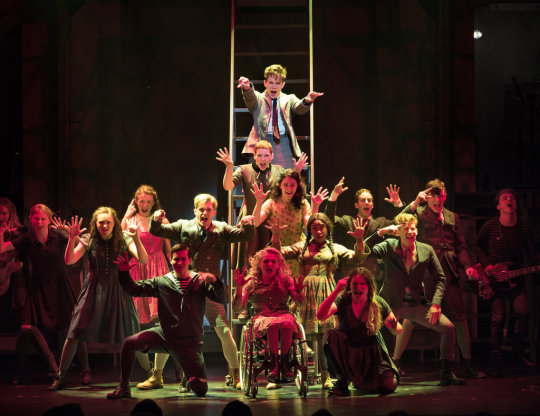

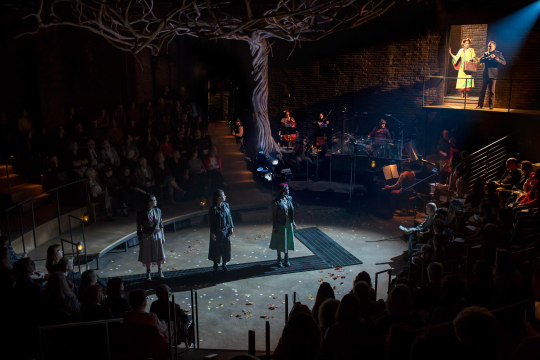



#broadway#west end#musical theatre#musical theater#falsettos#falsettos revival#spring awakening#deaf west spring awakening#next to normal#moulin rouge#oklahoma!#west side story#jamie muscato#aaron tveit#karen olivo#musicals#dwsa#ali stroker#hadestown#hadestown nytw#christian borle#andrew rannells#sexy oklahoma#oklahoma 2019#wss
231 notes
·
View notes